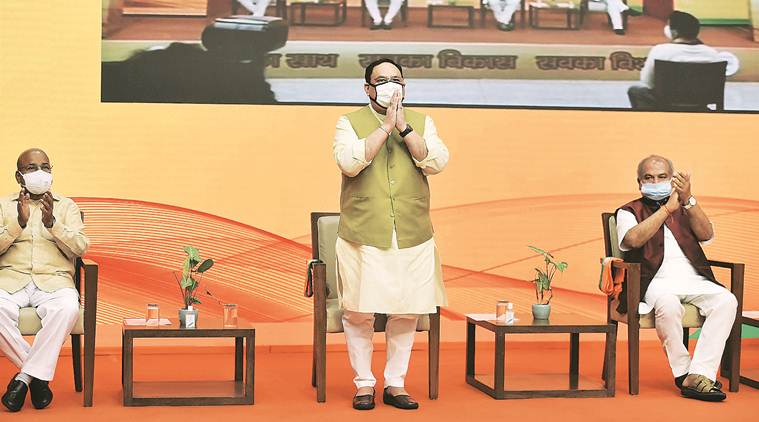 BJP president J P Nadda addresses a virtual rally from the party headquarters in New Delhi. (PTI)
BJP president J P Nadda addresses a virtual rally from the party headquarters in New Delhi. (PTI)
Opposition parties in Bihar have objected to virtual rallies as a mode of campaigning for the upcoming Assembly elections.
The RJD, CPI, CPI (M), NCP, BSP and RLSP have argued that digital campaigning would violate the level-playing field and favour rich parties with “resources”. They pitched for small meetings and gatherings of voters instead. The parties put their views forward in an all-party meeting called by the Bihar Chief Electoral Officer (CEO) on June 26.
The BJP, which held virtual rallies throughout last month, supported the digital mode of campaigning in the all-party meeting and said it would be “inappropriate” for the Election Commission (EC) to ban it.
Its ally JD(U) was silent on virtual rallies specifically. But the party representative said that some political parties were contradicting themselves by asking the EC to allow big campaign rallies while seeking a cap of 700 on the number of voters at a polling booth. LJP, a member of the ruling NDA, also did not offer any suggestion on digital campaigning.
The EC will in all likelihood conduct Bihar elections on time amid the pandemic. In a strong indication of this, the Commission has already convinced the Law Ministry to allow Covid-affected patients to vote through postal ballots.
The EC isn’t opposed to the idea of digital campaigning. In an interview to The Indian Express last month, Election Commissioner Sushil Chandra had said that “parties will have to rely on virtual rallies and campaigning through social media” during Bihar elections.
To ensure social distancing, the EC has decided to limit the number of voters at each polling booth to 1,000, instead of 1,600 in normal circumstances. Parties have suggested bringing this number down further. The LJP indicated that the maximum number of voters at a booth should be 500 and the CPI and JDU wanted it to be capped at 700.
The BJP and JDU also supported fewer polling phases. While BJP wanted elections in two phases, the latter pitched for a single phase. Last time, Assembly elections in Bihar were held in five phases.
The EC on Wednesday wrote to CPM defending its decision to allow 65-year-olds to vote through postal ballots in the upcoming election. The Commission said the decision was taken to protect vulnerable groups during polls while ensuring they are not deprived of their voting rights.
CPM leader Sitaram Yechury had questioned the move saying the poll body bypassed the established practice of consultation with political parties. The EC, in turn, pointed out that it was consulting political parties before polls and attached minutes of the all-party meeting called by the Bihar CEO on June 26.